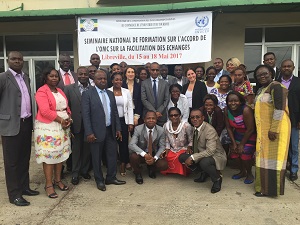
The entry into force of the Trade Facilitation Agreement (TFA), last 22 February 2017, calls on Member Countries of the World Trade Organization (WTO) to establish National Trade Facilitation Committees (NTFCs). Based on TFA Art.23 on Institutional Arrangements, such Committees are entrusted with the role of coordinating Countries’ efforts to put in place the provisions of the Agreement for simple, effective and fast trade transactions.
As of today, there are about 80 Member Countries that have formally established such Committees, and about 20 that have a de facto Committee in place. The NTFCs are important platforms for institutional coordination and stakeholders' consultation, with balanced private and public sector participation.
Both Cameroon and Gabon have ratified the Agreement in 2016. They are now in the process of establishing their Committees and are working on the notifications of special and differentiated treatment obligations for which they need a transitional implementation period (category B) and technical assistance (category C). Both Countries are part of the Empowerment Programme for NTFCs led by UNCTAD, and funded by the European Union, that UNECE with its UN/CEFACT, is supporting in several Countries around the world.
On 9 to 12 May and 15 to 19 May, UNECE experts contributed to deliver Module 1 of the Programme, in Douala and Libreville respectively, where secretaries and members of the NTFCs have learned about principles and benefits of trade facilitation; recommendations and good practices for preparing the terms of reference and the programme of work of NTFCs; the legal aspects of the WTO TFA and the substantive and procedural requirements for its implementation; and the international instruments and standards that can help put the Agreement in place.
“Having the NTFC in place marks an important milestone in the efforts to foster the facilitation of trade in our country. Its operational functioning requires now an effective consultation mechanism among all parties involved and a strong alliance between public and private actors” Mrs. Berre, Minister for the Promotion of Private Investments, Trade, industry and Tourism of Gabon, said in closing the workshop.
UNECE has a lot to offer in this context, in terms of instruments, expertise and experience. UNECE Recommendation N.4 on National Trade Facilitation Bodies, Recommendation N. 40 on Consultation Approaches, and Recommendation N. 41 on PPP in Trade Facilitation, are important reference instruments for the Terms of Reference, governance and modus operandi of the NTFCs. In line with its long-standing commitment, UNECE, in a joint effort with key international partners, has actively participated in the establishment of NTFCs in both transition and developing economies, and has contributed to the development of the UNCTAD Repository, containing case studies from Countries around the world having such Committees in place. In addition, the UNECE Trade Facilitation Guide provides guidance, recommendations for relevant implementing instruments to Countries and experts embarking in this type of efforts.
For more information, please contact Maria Teresa Pisani, [email protected]

